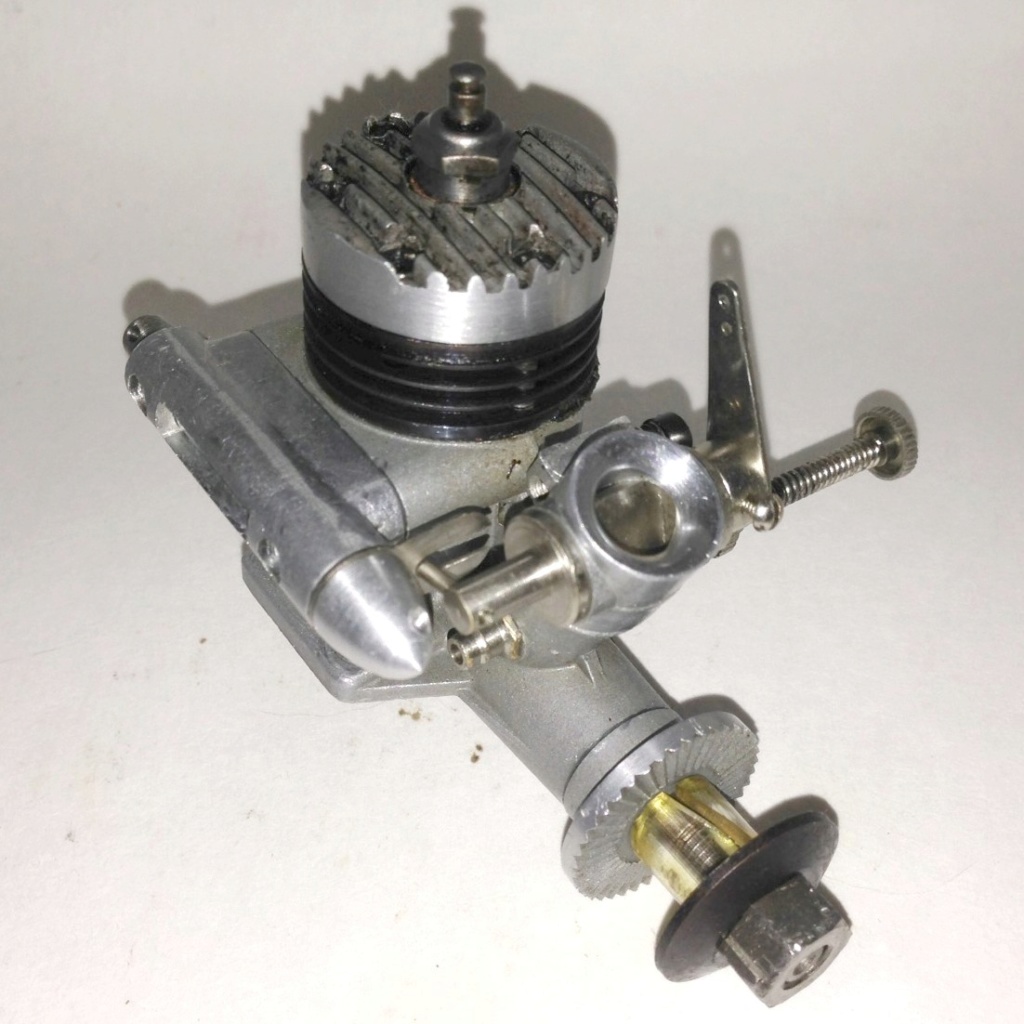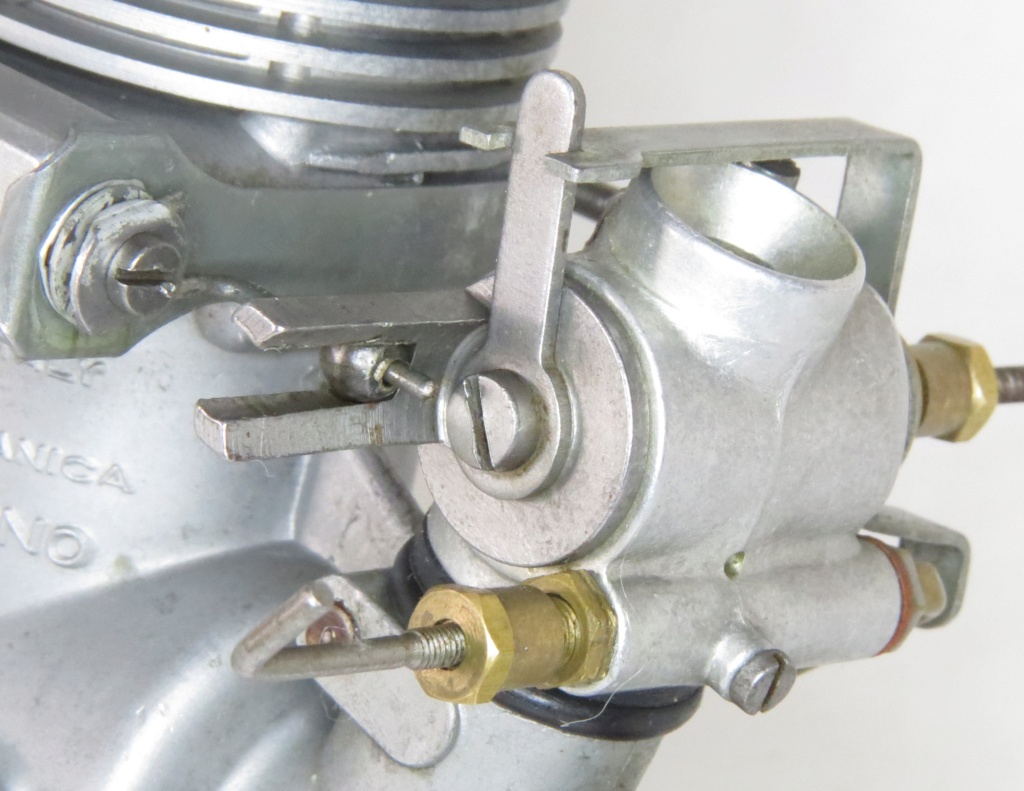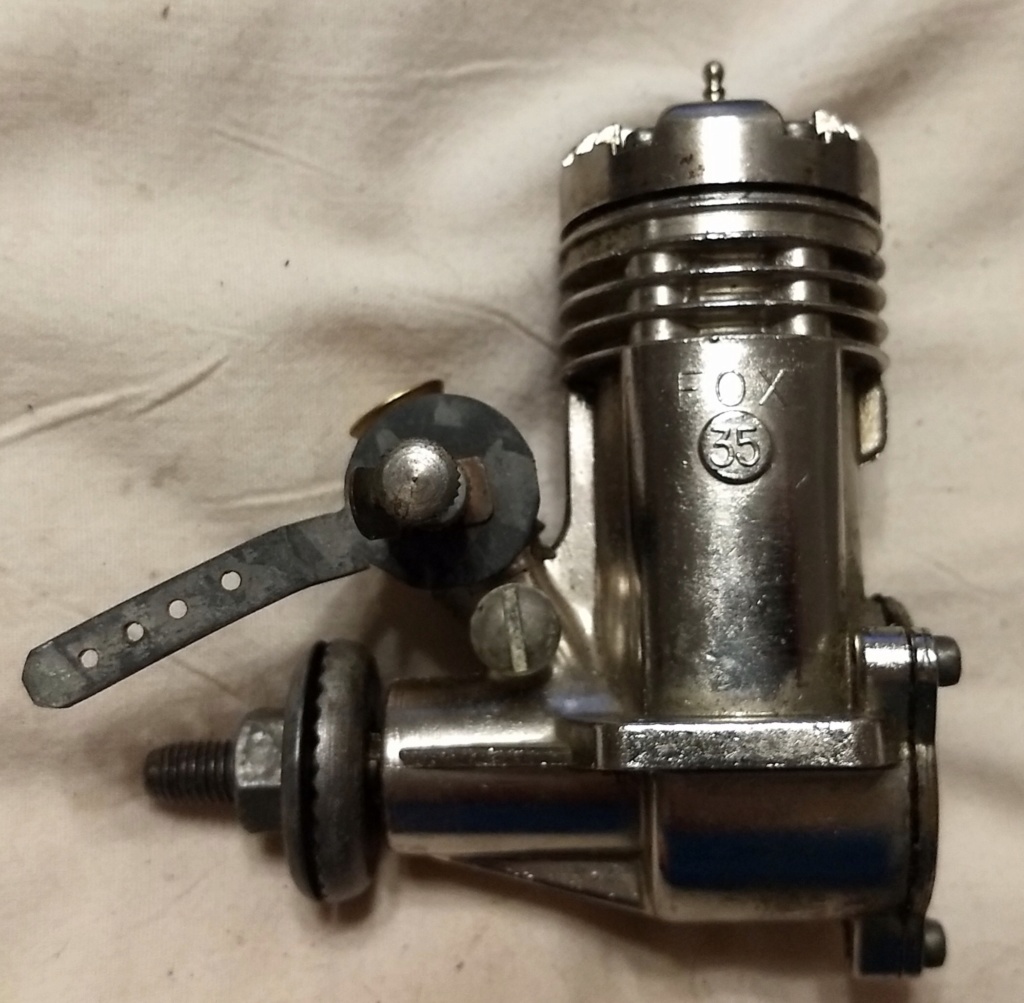Log in
Search
Latest topics
» It's the X Wing that has a canardby 1975 control line guy Today at 12:12 am
» My current avatar photo
by GallopingGhostler Yesterday at 7:02 pm
» Cox 020 PeeWee rebuild questions
by LooseSpinner99 Yesterday at 4:38 pm
» music vids.. some of your favorites
by Kim Yesterday at 3:28 pm
» New Model Build
by bsadonkill Yesterday at 1:19 pm
» Kofuku Maru Fishing Boat Model
by Levent Suberk Yesterday at 11:39 am
» Free Flight Radio Assist
by rdw777 Yesterday at 11:24 am
» TEE DEE Having issues
by GallopingGhostler Wed Nov 13, 2024 11:38 pm
» Pathé Modeling Videos
by Levent Suberk Wed Nov 13, 2024 2:10 pm
» My latest doodle...
by layback209 Wed Nov 13, 2024 1:20 am
» Drones, pretty nifty...........
by rsv1cox Tue Nov 12, 2024 6:55 pm
» Project Cox .049 r/c & Citabrian Champion
by roddie Tue Nov 12, 2024 6:20 pm
Cox Engine of The Month
Throttle show and tell
Page 1 of 1
 Throttle show and tell
Throttle show and tell
The original thread was getting quite long and I sure didn't want to hi-jack it, so here are some more seldom seen setups. Early on, different ways of choking the engines were quite popular. Flaps made from "tin can stock" were quite popular. You'll see that many of the early throttle were just fancied up ways of doing the same thing. Here's an OS Pet (1958) factory choke:




The intake throttle on the 1957 Max 29 II was just a choke on a wire. A rotating cylindrical exhaust valve was use, the early ones only had the streamlined nut on the front end:

The intake throttle on the 1958 Max 15II was a choke formed by machining flats on a rotating cylinder. An air bleed was added. A rotating cylindrical exhaust valve was use, the early ones only had the streamlined nut on the front end:

I thought Fox had the wildest throttles until I saw this on a 1964 Super Tigre V51. The exhaust baffle is pretty conventional. The intake is a rotating barrel with the high speed jet connected internally to the main fuel passage. There is a SECOND jet for low speed that comes in once the barrel is near closed and there is an airbleed. But look at what was done to connect the intake and exhaust! A stamped and formed metal bridge to cross over the carb and a stamped arm to connect the rotary motion. This arm is connected by friction to a MACHINED slotted carrier. The slot in the carrier is machined for close clearance on the exhaust connecting wire. As the intake barrel rotates, the carrier rotates and the ball follows, sliding on the wire and rotating the exhaust valve. What a tour de force!




Finally to keep this a Cox Forum, the 1964 Medallion throttle. Another slick way connect to connect a rotary intake with a push pull exhaust valve.

One last note. Manufacturers got away from the exhaust valves once mufflers were required and started producing endless varieties of carburetors. But Hi Johnson actually had the problem licked way back in 1961. This is the blue carb on the Bulldog. Hi had designed a carb with variable mixture control long before the Perry. A story goes Hi tried to license the design to Fox, but Duke said, "no thanks, I know how to build carbs", HA!




The intake throttle on the 1957 Max 29 II was just a choke on a wire. A rotating cylindrical exhaust valve was use, the early ones only had the streamlined nut on the front end:

The intake throttle on the 1958 Max 15II was a choke formed by machining flats on a rotating cylinder. An air bleed was added. A rotating cylindrical exhaust valve was use, the early ones only had the streamlined nut on the front end:

I thought Fox had the wildest throttles until I saw this on a 1964 Super Tigre V51. The exhaust baffle is pretty conventional. The intake is a rotating barrel with the high speed jet connected internally to the main fuel passage. There is a SECOND jet for low speed that comes in once the barrel is near closed and there is an airbleed. But look at what was done to connect the intake and exhaust! A stamped and formed metal bridge to cross over the carb and a stamped arm to connect the rotary motion. This arm is connected by friction to a MACHINED slotted carrier. The slot in the carrier is machined for close clearance on the exhaust connecting wire. As the intake barrel rotates, the carrier rotates and the ball follows, sliding on the wire and rotating the exhaust valve. What a tour de force!




Finally to keep this a Cox Forum, the 1964 Medallion throttle. Another slick way connect to connect a rotary intake with a push pull exhaust valve.

One last note. Manufacturers got away from the exhaust valves once mufflers were required and started producing endless varieties of carburetors. But Hi Johnson actually had the problem licked way back in 1961. This is the blue carb on the Bulldog. Hi had designed a carb with variable mixture control long before the Perry. A story goes Hi tried to license the design to Fox, but Duke said, "no thanks, I know how to build carbs", HA!

GWILLIEFOX- Rest In Peace

- Posts : 304
Join date : 2014-12-23
Age : 81
Location : Beaver Falls, PA

crankbndr- Top Poster

- Posts : 3109
Join date : 2011-12-10
Location : Homestead FL

crankbndr- Top Poster

- Posts : 3109
Join date : 2011-12-10
Location : Homestead FL
 Re: Throttle show and tell
Re: Throttle show and tell
An interesting array of rare collector engines, GWILLIEFOX, it is amazing all the ingenuity that went into the early engines before successful and acceptable plus cost effective solutions were settled on. All this to meet the demands of primitive RC systems, and in some cases I imagine for CL carrier events.GWILLIEFOX wrote:The original thread was getting quite long and I sure didn't want to hi-jack it, so here are some more seldom seen setups. Early on, different ways of choking the engines were quite popular. Flaps made from "tin can stock" were quite popular. You'll see that many of the early throttle were just fancied up ways of doing the same thing. Here's an OS Pet (1958) factory choke [....]
GWILLIEFOX wrote:Finally to keep this a Cox Forum, the 1964 Medallion throttle. Another slick way connect to connect a rotary intake with a push pull exhaust valve.
One last note. Manufacturers got away from the exhaust valves once mufflers were required and started producing endless varieties of carburetors. But Hi Johnson actually had the problem licked way back in 1961. This is the blue carb on the Bulldog. Hi had designed a carb with variable mixture control long before the Perry. A story goes Hi tried to license the design to Fox, but Duke said, "no thanks, I know how to build carbs", HA!
Let's face it, the Cox Medallion throttle control let alone Hi's meticulously clean carburettor were fine pieces of machinery akin to Swiss watches. They look too good and refined to be fitted to an old iron Fox.

crankbndr wrote:The Fox .40 RC is strange bird, I have three new can't give em away.
Probably approaching the wrong crowd, IMO. The odd exhaust throttle baffle can be removed, engine can be easily restored to control line use. The right place to post would be for sales sections in Stunt Hangar and Stuka Stunt forums.

GallopingGhostler- Top Poster


Posts : 5709
Join date : 2013-07-13
Age : 70
Location : Clovis NM or NFL KC Chiefs

GWILLIEFOX- Rest In Peace

- Posts : 304
Join date : 2014-12-23
Age : 81
Location : Beaver Falls, PA

Jason_WI- Top Poster


Posts : 3123
Join date : 2011-10-09
Age : 49
Location : Neenah, WI
 Re: Throttle show and tell
Re: Throttle show and tell
Jason, that Fox looks like someone used some Mother Mag and Aluminum Polish on its surface (BTDT).
Doing a little reading into Fox history, seems that sometimes improvements during production occurred "on the fly". Now it's all a part of history.
Thanks for sharing, GWILLIEFOX.
That is interesting to say, nonetheless. Special Fox custom end milling of the head is telling, along with the odd piston baffle dam on top. You have a point, defies logic. I thought that removal of the throttle barrel assembly, one could just restore a standard venturi setup, but then I'm not a dyed in wool Fox guy.GWILLIEFOX wrote:Sure you can remove the exhaust baffle, but you would need to wire the throttle barrel open. And while it would run, I'm not sure if the RC piston and head would do a stunt run
Doing a little reading into Fox history, seems that sometimes improvements during production occurred "on the fly". Now it's all a part of history.
Thanks for sharing, GWILLIEFOX.

GallopingGhostler- Top Poster


Posts : 5709
Join date : 2013-07-13
Age : 70
Location : Clovis NM or NFL KC Chiefs
 Re: Throttle show and tell
Re: Throttle show and tell
Your shiny FOX is a 1963 15th anniversary Stunt 35. It was originally gold coated. The gold wasn't very good plating and often rubbed or flaked off. Your engine looks in pretty good shape. If you can carefully remove the throttle and install a stock stunt 35 nav, you'll have a very nice engine.

GWILLIEFOX- Rest In Peace

- Posts : 304
Join date : 2014-12-23
Age : 81
Location : Beaver Falls, PA
 Re: Throttle show and tell
Re: Throttle show and tell
It does have a gold hue to it.
Is this the correct NVA for this engine?
https://rover.ebay.com/rover/0/0/0?mpre=https%3A%2F%2Fwww.ebay.com%2Fulk%2Fitm%2F273347335035
More than I paid for the engine.
Is this the correct NVA for this engine?
https://rover.ebay.com/rover/0/0/0?mpre=https%3A%2F%2Fwww.ebay.com%2Fulk%2Fitm%2F273347335035
More than I paid for the engine.

Jason_WI- Top Poster


Posts : 3123
Join date : 2011-10-09
Age : 49
Location : Neenah, WI
 Re: Throttle show and tell
Re: Throttle show and tell
That’s the standard stunt .35 needle. On the CL version it would go through the venturi stack, but on yours it’s not milled.
I may have a standard needle you can have. I am away from home but will check upon my return.
I may have a standard needle you can have. I am away from home but will check upon my return.

Cribbs74- Moderator



Posts : 11907
Join date : 2011-10-24
Age : 50
Location : Tuttle, OK
 Re: Throttle show and tell
Re: Throttle show and tell
This is the other NVA I could find.
https://rover.ebay.com/rover/0/0/0?mpre=https%3A%2F%2Fwww.ebay.com%2Fulk%2Fitm%2F223294932974
It may all be a moot point. I got the carb out as it was epoxied in but it looks like the Venturi hole was drilled out. Was was the Venturi size on this engine?
https://rover.ebay.com/rover/0/0/0?mpre=https%3A%2F%2Fwww.ebay.com%2Fulk%2Fitm%2F223294932974
It may all be a moot point. I got the carb out as it was epoxied in but it looks like the Venturi hole was drilled out. Was was the Venturi size on this engine?

Jason_WI- Top Poster


Posts : 3123
Join date : 2011-10-09
Age : 49
Location : Neenah, WI
 Re: Throttle show and tell
Re: Throttle show and tell
It looks like the top of the venturi is intact. I wouldn't worry about the ID, you're not going to run this engine. It looks like if you carefully remove the epoxy from the hole in the right side, you'll get to original metal.. The original nva was a plain steel needle with flat in the end. The spring keeper was black steel. The spraybar was brass with light grooves on the fuel line end. The spraybar had 2 holes installed so the holes were perpendicular to the CL of the venturi bore.
Your spraybar is second from left. Your clip is like the brass one, but black steel.
None of the ones you show on EBay are correct

Your spraybar is second from left. Your clip is like the brass one, but black steel.
None of the ones you show on EBay are correct

GWILLIEFOX- Rest In Peace

- Posts : 304
Join date : 2014-12-23
Age : 81
Location : Beaver Falls, PA
 Re: Throttle show and tell
Re: Throttle show and tell
Jason, the Fox Stunt .35 needle that you show on your first link is quite poor. They're nothing to brag about, they work but they don't come without issue. The needle threads are rolled and this is one source of air leakage. Unfortunately, they break if the wind blows hard enough. Even a accidental strike from a finger can break them. Mecoa being the new owner of the defunct company is either producing them or just found them. The fuel line never fit the nipple correctly requiring some tie wire to assist in keeping it on. They're also the newer continuous tapered production style unlike the flat taper that Bill depicts. To achieve the proper setting, they're barely screwed into the spraybar which unless the ratchet clip was over bent, they would vibrate out. The indexing on some spraybars were better than others requiring multiple spraybars in order to find one where you had a decent amount of threads into it.
The last version that offered the flat tapered needle was the 40th anniversary introduced in the 80's. When the newer non flattened tapered needle was introduced, the spraybars didn't always coincide with the 40th anniversary spraybars.The last spraybar versions were non plated brass on the 50th, 60th anniversary and these weren't as much of a problem. The thread size is 3-48 which is a bastard size to begin with and I've always contemplated making my own replacements as a true die cut thread fits tighter in the spraybar. Unfortunately, sourcing a 3-48 screw long enough is not such a simple task as they're generally offered in 3/4" and less increments.
The last version that offered the flat tapered needle was the 40th anniversary introduced in the 80's. When the newer non flattened tapered needle was introduced, the spraybars didn't always coincide with the 40th anniversary spraybars.The last spraybar versions were non plated brass on the 50th, 60th anniversary and these weren't as much of a problem. The thread size is 3-48 which is a bastard size to begin with and I've always contemplated making my own replacements as a true die cut thread fits tighter in the spraybar. Unfortunately, sourcing a 3-48 screw long enough is not such a simple task as they're generally offered in 3/4" and less increments.

Ken Cook- Top Poster

- Posts : 5634
Join date : 2012-03-27
Location : pennsylvania
 Similar topics
Similar topics» Cox planes on Ebay
» At my last gun show
» Cylinder Porting
» Old Enya Show And Tell....
» Show and Tell
» At my last gun show
» Cylinder Porting
» Old Enya Show And Tell....
» Show and Tell
Page 1 of 1
Permissions in this forum:
You cannot reply to topics in this forum

 Rules
Rules












